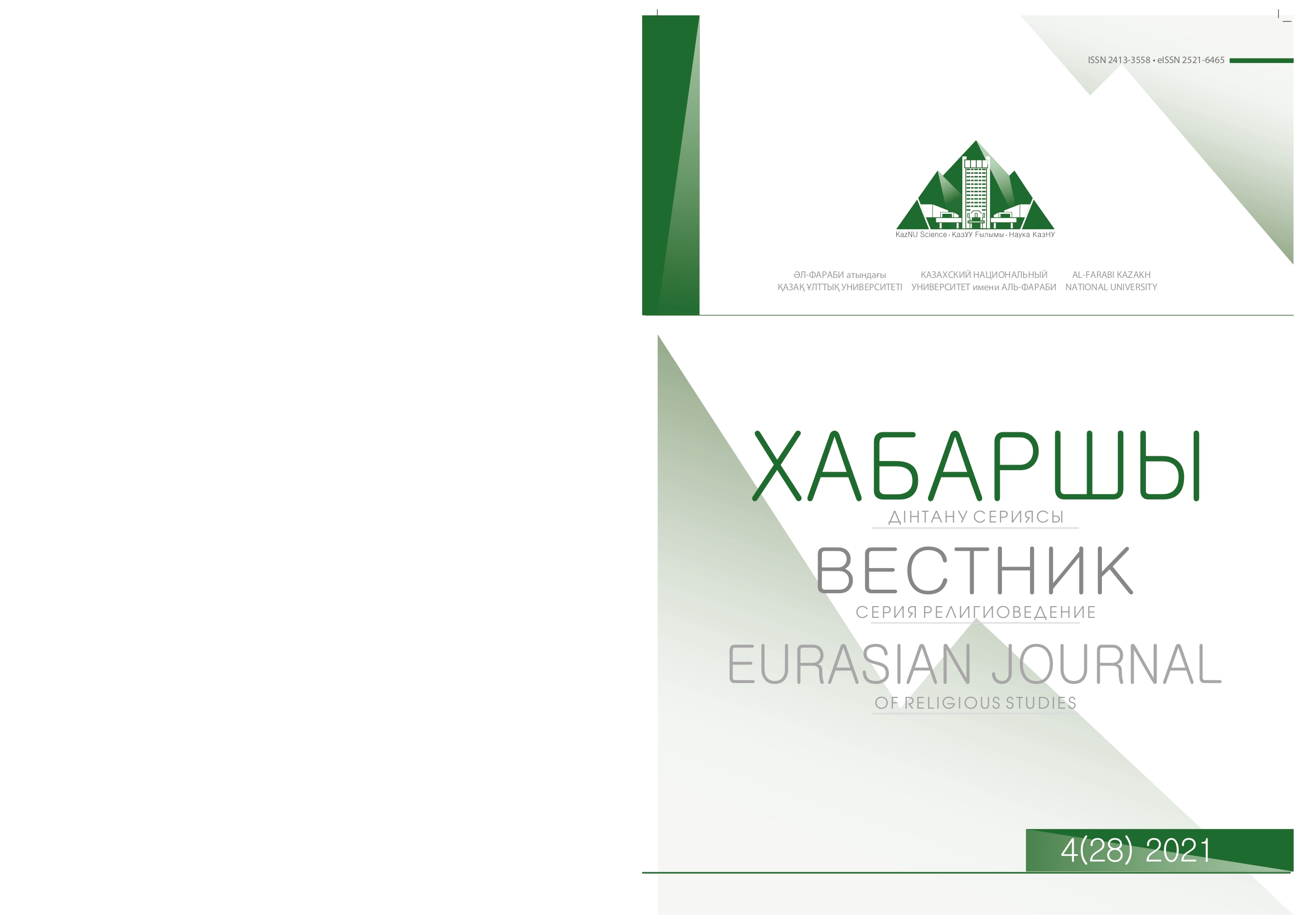Formation of a new religiosity
DOI:
https://doi.org/10.26577//EJRS.2021.v28.i4.r9Keywords:
Globalization, Islam, Fundamentalism, Religious movements, Islamic revivalAbstract
The main issue discussed in the article examines the reasons that led to the emergence and formation of religious groups in the global world. Today we see that global relations have contributed to the development of some ancient traditions and customs, but also led to their decline. However, how much does globalization affect modern religious trends? In this regard, despite the weakening of religious values due to political pressure, this phenomenon has revived over time, and in the current era of globalization, one can observe the emergence and formation of new religious groups. We can say that fundamentalism is a product of this global society. This is a reaction to the processes of globalization and secularization that are taking place in modern society as a whole. Fundamentalism has also led to a revival of previously forgotten religious institutions. In the very terminology of Islamic fundamentalism, we see that there are various conflicting opinions among scholars. Religious scholars believe that this is a terminology that is common to all religions, although Islamic scholars say it does not make sense because the word comes from Christianity and does not correspond to Islamic teachings. In general, we know that this term has recently begun to be used not only in the religious sphere, but also in the entire social sciences. This article aims to offer an analysis of this term and to analyze the processes of the formation of a new religiosity.
Keywords: Globalization, Islam, Fundamentalism, Religious movements, Islamic revival.
References
Blanchard, C.M. (2008) The Islamic traditions of Wahhabism and Salafiyya, CRS Report for Congress. available at https://www.fas.org/sgp/crs/misc/RS21695.pdf
Chaliand, G., Blin, A. (2007) The history of terrorism from antiquity to al Qaeda. –London: «Maple-Vail Manufacturing Group». – 474.
Duchacek, I.D., Latouche, D., Stevenson, G. (1988) Perforated Sovereignties and International Relations: Trans-Sovereign Contacts of Subnational Governments. – New York: «Greenwood». –256.
Hunter, S.T. (1998) The Future of Islam and the West: Clash of Civilizations or Peaceful Coexistence? – London: «Washington, D.C». –275.
Huntington, S. (1998) The Clash of Civilizations and the Remaking of World Order. – London: «A Touchstone book». –367.
Jupille, J., Joliff, B., Wojcik, S. (2014) Regionalism in the World Polity. http://aei.pitt.edu/52869/1/JUPILLE.pdf
Meyer, J.W. (2009) Globalization: Sources and Effects on National States and Societies, in Krücken and Drori. https://journals.sagepub.com/doi/abs/10.1177/0268580900015002006
Meyer, J.W., Boli, J., Tomas, G. M and Ramirez, F.O. (1997) World Society and the Nation-State, American Journal of Sociology https://doi.org/10.1086/231174.
Meyer, J.W., Rowan, B. (2009) Institutionalized Organizations: Formal Structure as Myth and Ceremony, in Krücken and Drori. – Chicago: «The University of Chicago Press». –363.
Reiser, O.L., Davies, B. (1944) Planetary Democracy: An Introduction to Scientific Humanism and Applied Semantics. – New York: «Creative Age Press». –339.
Roy, O. (2005) The crisis of the secular state and new forms of religious expression, available at http://www.diplomatie.gouv.fr/en/IMG/pdf/0101Roy_gb.pdf
Roy, O. (2009) Аvailable at http://www.eui.eu/Documents/RSCAS/Research/MWG/200910/MWG2009-12-16Roy.pdf
Джалилов З.Г. (2006) Ислам и общество в современном Казахстане.–Алматы: «Дайк-Пресс». –204.
Джуманова, Г.Ж. (2009) Казахстанско-Немецкий университет. 6th International Conferenсe.–Алматы: «ИП Волкова». –372.
Челишев, И.В. (2010) Фундаментализм и фундаменталисты.–Москва: «РГСУ». –528.
References
Blanchard, C.M. (2008) The Islamic traditions of Wahhabism and Salafiyya, CRS Report for Congress. available at https://www.fas.org/sgp/crs/misc/RS21695.pdf
Chaliand, G., Blin A. (2007: 274-275) The history of terrorism from antiquity to al Qaeda. – London: «Maple-Vail Manufacturing Group».–474 р.
Chelishev, I.V. (2010) Fundamentalizm i fundamentalisty`.–Moskva: «RGSU».–528 s.
Duchacek, I. D., Latouche, D., Stevenson, G. (1988) Perforated Sovereignties and International Relations: Trans-Sovereign Contacts of Subnational Governments.–New York: Greenwood.–256 р.
Dzhalilov Z.G. (2006) Islam i obshhestvo v sovremennom Kazakhstane.–Almaty`: «Dajk-Press».–204 s.
Dzhumanova, G.Zh. (2009) Kazakhstansko-Nemeczkij universitet. 6th International Conferense. – Almaty`: «IP Volkova».–372 s.
Hunter, S.T. (1998) The Future of Islam and the West: Clash of Civilizations or Peaceful Coexistence?– London: «Washington, D.C».–275 p.
Huntington, S. (1998) The Clash of Civilizations and the Remaking of World Order.–London: «A Touchstone book».–367 р.
Jupille, J., Joliff, B., Wojcik, S. (2014) Regionalism in the World Polity. http://aei.pitt.edu/52869/1/JUPILLE.pdf.
Meyer, J.W. (2009) Globalization: Sources and Effects on National States and Societies, in Krücken and Drori. https://journals.sagepub.com/doi/abs/10.1177/0268580900015002006.
Meyer, J.W., Boli, J., Tomas, G. M and Ramirez, F.O. (1997) World Society and the Nation-State, American Journal of Sociology. https://doi.org/10.1086/231174.
Meyer, J.W., Rowan, B. (2009) Institutionalized Organizations: Formal Structure as Myth and Ceremony, in Krücken and Drori.–Chicago: «The University of Chicago Press».–363 p.
Reiser, O.L., Davies, B. (1944) Planetary Democracy: An Introduction to Scientific Humanism and Applied Semantics. – New York: «Creative Age Press».–339 р.
Roy, O. (2005) The crisis of the secular state and new forms of religious expression, available at http://www.diplomatie.gouv.fr/en/IMG/pdf/0101Roy_gb.pdf
Roy, O. (2009) Аvailable at http://www.eui.eu/Documents/RSCAS/Research/MWG/200910/MWG2009-12-16Roy.pdf













